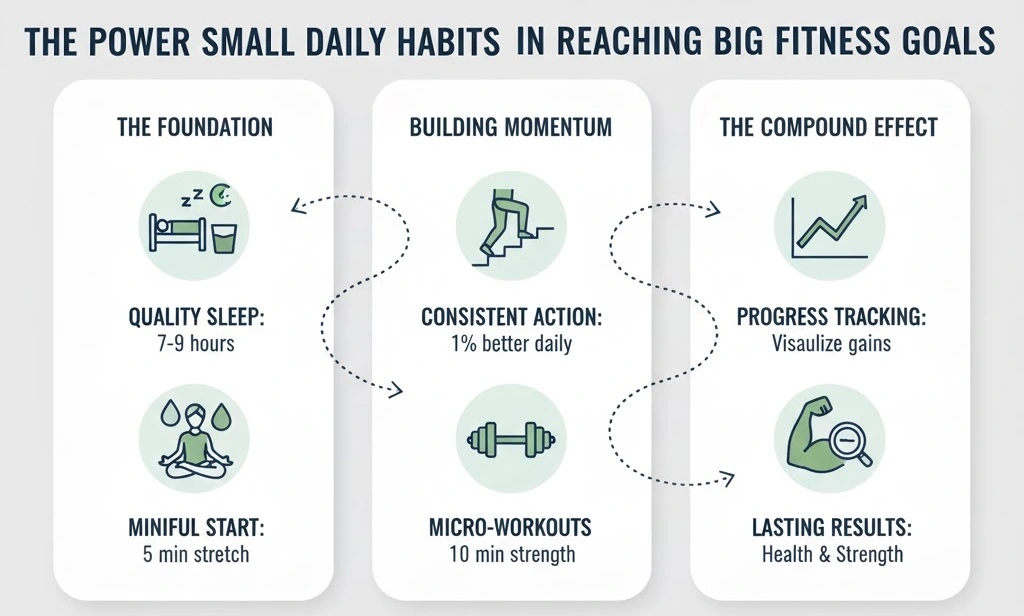Big goals are exciting. They stimulate our imagination and create visions of a stronger body, better health or a lifestyle that feels completely different from our current one. But as exciting as they sound, these big goals can be intimidating. The pressure can be so overwhelming that they hold back to us instead of motivating us.
The reality is that true changes do not normally result from major changes overnight. Rather, it is due to the small, almost unnoticed habits that we integrate into our daily life. These small actions may seem insignificant in themselves, but together they have the power to change our fitness and our self -image.
Why the little one is stronger than the big one
When many people decide to seriously deal with fitness, they imagine dramatic efforts, such as strict diets, long training sessions in the gym and perfect routines. The problem is that life rarely allows us to do everything perfectly. Work plans, family commitments, stress and unexpected events can quickly destroy the dynamics of ambitious plans. For this reason, so many resolutions fail within a few weeks.
However, small habits are designed for survival. They are also easy to follow on hectic days. A five -minute stretch before going to bed, choosing water instead of lemonade or walking an additional block may seem insignificant at the moment, but these small successes remain when life becomes overwhelming. They slowly build up a dynamic, and this dynamic is far more than intensity spurts that cannot be maintained.
Psychologists refer to this as the increasing effect of habits. Every action in itself may feel like a drop of water, but for weeks and months these drops form an ocean of progress. It is even more important that success with small measures strengthens trust in itself. Every time you keep the promise to move, rest or nourish your body, strengthen the belief that you are capable of changes.
The invisible architecture of fitness
Fitness is not just about muscles or endurance. It is also about the invisible framework that you create during your day. Sleep, fluid intake, relaxation and thinking form the hidden structure that determines how far you can demand your body. Studies show that even minor improvements in sleep quality sharpen the concentration, increase strength and accelerate recovery. Similarly, sufficient fluid intake not only breaks thirst, but prevents tiredness, helps with the regulation of body temperature and ensures a consistent performance during training.
Even the smallest changes in these areas: go to bed 30 minutes earlier, drink a glass of water after waking up and take a deep breath in front of a meeting for a moment, form the foundation on which larger goals can stand. They are the building blocks that provide stability. If this basis is ignored, even the most determined training plan will fail at some point.
Military way, identity and the habitual connection
One of the most interesting aspects of habitual science is their connection with identity. People who themselves as “someone who trains”, “someone who eats well” or “someone who attaches value to relaxation” see, care for healthy routines. It’s not just about willpower; It’s about how you see yourself.
If you start considering small habits as an expression of your personality and not as a tasks to be picked up, it becomes easier to maintain it. Drinking water is not a rule; It is something a healthy person does. A little walk after dinner is not a burden; It is what active people just do. Identity comes first and the behavior follows more naturally.
Subtle external information also plays a role here. Something as simple as updating your online presence can strengthen your self-image. With A Profile picture manufacturer A healthier, more self -confident version of itself may seem trivial, but these visual clues can reinforce the inner voice, which says: “This is who I will.” If your identity and habits agree, you no longer feel forced, but feel automatically.
The role of forgiveness and flexibility
Despite a strong way of thinking, setbacks happen. You may miss a training session, treat yourself to late -night snacks or forget to stretch. What distinguishes long -term progress of burnout is not perfection, but forgiveness. Those who allow it to falter are successful without getting out of the track completely.
Instead of thinking: “I ruined my week by leaving two training sessions”, it is more productive to say: “I still moved my body yesterday, even if it wasn’t what I had planned.” The nice thing about small everyday habits is their incredible forgiveness. If you miss one, you can continue the next day without a guilty conscience. There is no dramatic restart or the need to revise everything. Flexibility is integrated in the system.
The science behind the little one
Recent research has confirmed the importance of daily habits. Studies published in 2024 show a strong connection between identity and habit. People who start to see themselves as “fit individuals” tend to learn and maintain health -promoting behavior much more easily. This indicates that it is not only important to move or eat well, but also to the narrative that you tell about who you will be.
Other studies show that small actions such as short breaks can significantly reduce health risks during the day, even if they are not comparable to conventional training sessions. Stair climbing a few minutes, a brisk walk around the block or a few squats with your own body weight at home offer advantages for heart and metabolism that go far beyond what suggests your duration. In other words, the body is rewarded with resistance, not large gestures.
Stories that show the ripple effect
Think of the person who has only started running for ten minutes every evening. At first it felt trivial, but within a few months this walk became an estimated routine. This led to longer walks, better sleep and finally to the self -confidence of joining a local running club. Or think of the office worker who started at his desk to do simple stretching exercises. This two minutes daily exercises in the office It not only reduced back pain, but also aroused the interest in yoga, which in turn improved the general strength and flexibility.
These stories show that a small action often triggers another. Habits rarely exist isolated. They spread out and influence decisions in other areas of life. What begins as a drop can eventually develop into a wave.
The long game of habits
What makes small habits so effective is their endurance. Although conspicuous, elaborate routines lead to short -term results, but are usually not permanent. However, integrated habits can last for a lifetime. When movement, fluid intake, sleep and careful relaxation become routine like brushing your teeth, fitness goals are not a thing you pursue, but part of your life.
That is the long game. It is not about running towards a finish line, but about building up a lifestyle that naturally supports health. The big results, regardless of whether it is visible changes in the muscle tone, endurance or general vitality, are slowly and quiet. Then one day, look back and recognize how far you have taken these little steps.
From drops to waves: where everything fits together
Every decision you make is a small drop in the larger pool of your life. In themselves, they may seem too small to be important, but over time they merge to wave these drops, which they bring closer to their fitness goals. Small daily habits are powerful because they are modest. They do not challenge perfection, they do not exhaust your willpower and they do not crumble when life becomes chaotic.
They only demand their attention and commitment to the moment that lies in front of them. If you give them the day after day, they reward you with something much larger than you expected. Ultimately, the strength of your fitness trip does not come from a single big impetus. It creates the calm, even rhythm of the little things that they do every day.
Faqs
F1: Why are small daily habits more effective than big changes in fitness?
Small habits can also be consistently maintained on busy or stressful days. Over time, they lead to significant improvements in health and fitness without being overwhelmed.
F2: How long does it take for a new fitness to get through?
Studies have shown that depending on the complexity and consistency, it can take between 21 and 66 days for a habit to automatically become. The key lies in the repetition, not in perfection.
F3: What are some examples of small habits that improve fitness?
Simple measures like every morning drinking a glass of water, walking after meals, stretching yourself before going to bed or specifying a fixed sleeping plan can have a great effect on daily exercise.
F4: How are habits related to the fitness identity?
When people see themselves as “someone who is doing sports” or “someone who eats well”, it is more likely that they keep healthy behavior. Due to identity, habits feel more natural than forced.
F5: Can short training sessions really make a difference?
Yes. Even a few minutes of activity such as climbing stairs or body weight movements improve the cardiovascular health, the energy level and the mood when exercising consistently.




